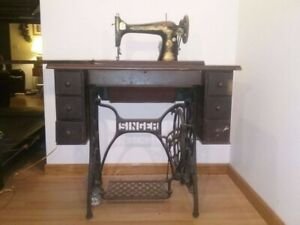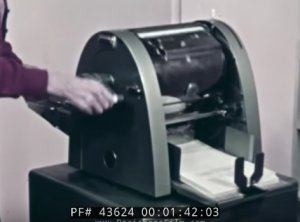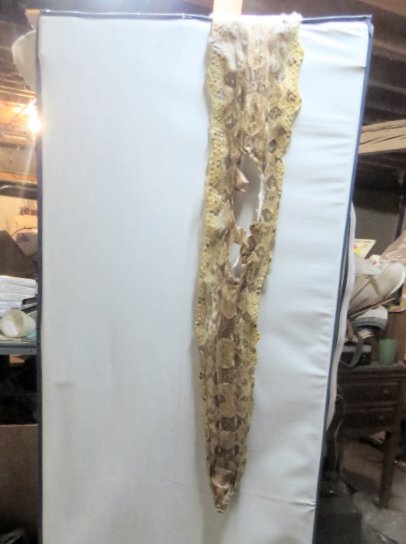Before and after the move. Continue reading
In early August of 1974 Sue and I drove out to Michigan to arrange for housing in or near Ann Arbor. I also wanted to consult with Dr. Colburn about my new responsibilities. We found a suitable apartment to rent on Sheldon Rd. in Plymouth, about midway between Ann Arbor and Detroit. We figured that Sue would probably be able to find a job without much trouble.
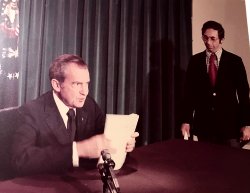
We brought our tent and camping equipment with us to save money on hotel rooms. After a few nights in the campgrounds we decided to splurge on a room for one night at a Ma & Pa motel. We chose the best possible night for it: on August 8, 1974, Nixon resigned as President, and we were able to watch him live on television. I was absolutely ecstatic. Everything seemed to be working out for me.
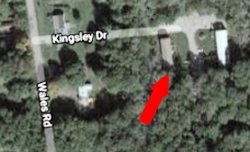
Shortly after our return to Andover we hosted a going-away party at the apartment. Absolutely everyone came. It lasted most of the night. I don’t remember very many details, but I definitely recall that when Herget’s girlfriend Mel kissed me goodbye, she REALLY kissed me. I was quite astounded by it.
The guys with whom I played golf gave me a yellow golf ball that they had all signed. I kept the ball for a long time, but I could not find it when I posted this page in 2021.
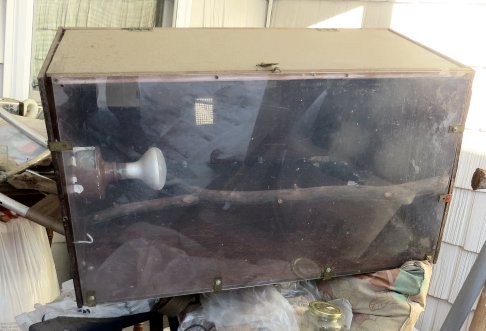
I am not certain whether we hired professional movers or just rented a trailer or truck to transport our stuff to Plymouth. We brought both cars. I don’t think that either of them could pull a trailer. The most likely scenario was that we rented a truck, and Sue drove it while towing her Dodge Colt.
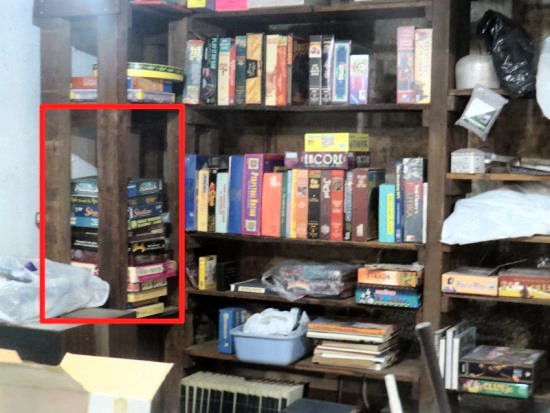
Because Sue had Puca1 with her, we needed to take the southern route through Pennsylvania and Ohio. It is not generally advisable to try to cross two international borders with a snake. The move, thank goodness, was relatively uneventful, but we were both quite excited about starting the upcoming adventure together.
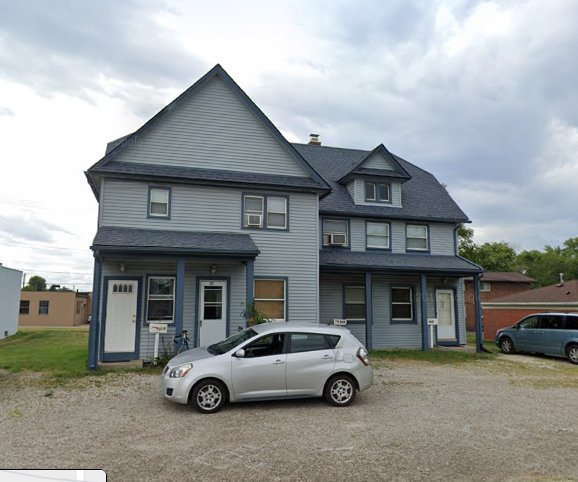
Our new dwelling was in a large house that had been converted into four apartments. Ours was on the ground floor on the southern side (on the right in the photo). The apartment had a bedroom, a living room, and a kitchen. Sue had acquired a double bed somewhere, and we put the waterbed in the living room. Puca’s cage was situated in the barnboard shelves that Dennis Comparetto had designed and built to hold him. We had a kitchen table and chairs and some dressers. We might have had a chair in the living room and/or a nightstand in the bedroom. Of course, we also brought my color TV and stereo and a few other necessities such as Sue’s cast-iron treadle-powered Singer sewing machine. The apartment came with a stove, refrigerator, and dishwasher.
The apartment had only one heating unit. It was a cube that was about 3.5 feet on a side. At least it did not require oil, as many heating systems in New England did (and still do). It was located in the living room near the door to the bedroom. As long as we kept the bedroom door open in the winter, this was not too inconvenient. Puca’s cage had a built-in heating lamp.
Tenants from all four units parked in front of the building. This might have been a problem if all four residents had two cars, but I do not remember the space ever being overcrowded. However, if anyone is considering moving to Michigan, I would not recommend outdoor parking. In fact, now that I have had a garage for a few years, I would not recommend outdoor parking anywhere. However, in those days we were in our twenties, and the cold and snow did not seem as bothersome.
Sue began hunting for a job. In a fairly short time she found one at an insurance company (it might have been an agency) in downtown Plymouth.
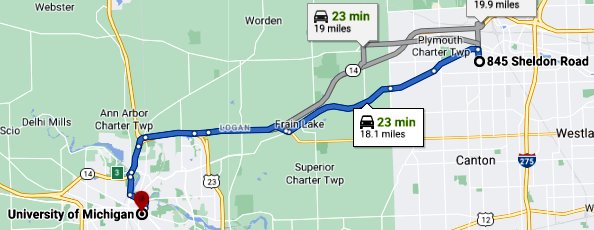
We also discovered plenty of nice paces to shop, including the first “super store” that either of us had ever seen. Meijer’s Thrify Acres (now just called Meijer), which was only three and half miles south of our house in Canton, was a huge supermarket that also sold just about anything that one could buy at KMart. They also had an employee named Marv who often was the cashier in the express lane. He was the most efficient at ringing and bagging that I have ever seen. I never saw him falter.
I started commuting to Ann Arbor. It was a fairly easy drive 90 percent of the time. The most likely problems were at both ends—getting Greenie to start in Plymouth and finding a parking spot in Ann Arbor. In cold weather I sometimes poured hot water directly on the engine before trying to start it. Once or twice I had to hitch-hike, which was not ideal. Fortunately, the people who gave me rides were uniformly friendly. I soon learned which side streets north of the Frieze building were likely sources of available parking. None of this bothered me at all.
During one of those first few days Dr. Colburn showed me where the debate office was. It was the smallest room on the second floor, but it was more than we had when I was debating—nothing. There were a couple of desks there, and a mimeograph machine. Dr. Colburn informed me that the team’s annual budget was $2500 plus whatever we made on the high school debate tournament that a separate area of the University sponsored. We had no control over how many teams entered or what the entry fee was. We had to run the tournament, and all that we received were the judging fees that the U-M debaters and a few supporters forwent and donated to the team. There was also still a stipend ($1,000 if memory serves) available to one female debater. This “scholarship” dated back to the fifties, but I never heard of anyone actually receiving any money when I was debating. I don’t think that we even had any female debaters when I was a freshman or senior.
In short, the program was even more pitifully underfunded than I expected. However, I was definitely up for the challenge.
I was not required to teach, but Dr. Colburn had arranged for me to get a grant of a few thousand dollars. My job was to coach debate. Period.
I learned that the previous debate season had ended in catastrophe. I was never sure of the details, but I do remember these facts: 1) Dr. Colburn was the only staff member from the previous year’s team who was still involved with it. 2) Two sophomores had represented U-M at the previous district qualifying tournament and lost all eight rounds. So, both of my stints at U-M began the year following 0-8 performances at districts.
I met the other debate coach for the upcoming year, Don Goldman. He had just graduated from Middle Tennessee State University (MTSU—pronounced MITT su), which was not exactly a debate powerhouse. He was pursuing a masters in speech, and part of his duties included teaching a class or two. He knew very little about debate, and he was four years younger than I was. Fortunately, he was very easy to get along with, he was quite willing to travel to some tournaments, and he did not at all object to me making all the decisions and doing the lion’s share of the coaching. His wife Terry was also nice.

The topic for the 1974-75 school year was “Resolved: That the powers of the Presidency should be significantly curtailed.” This was remarkably similar to the resolution debated in my junior year (1968-69), but that one was limited to foreign policy. This topic was wide open. I suspected that the limitation afforded by the word “significantly” would be negligible.
A few things had changed significantly since my last debate round. Sixteen teams that did well at tournaments throughout the year received invitations to the National Debate Tournament before the district tournaments. Moreover, their schools were allowed to send their second team to districts. In addition, eight at-large bids were sent out after the district tournaments. I did not realize it at the time, but the total size of the field at NDT had also been increased from forty-four to fifty-two.

Formats of the debates themselves had also changed. Opponents were allowed three minutes of cross-questioning after each constructive speech. In my day high school tournaments had “cross-x”, but very few college tournaments did. Another significant change was that each team was allotted ten minutes of preparation time during the debate. In theory, debaters in my day took no prep time at all. When one speaker sat down, the next was expected to stand up and talk. However, some debaters took so long gathering their materials together to the extent that a few notorious teams were actually taking even more than ten minutes in total. The judges had no guidance as to how much leeway to allow. With the new rule the judges felt more comfortable ordering the timekeeper to start clocking the speech when the ten minutes of prep time were exhausted.
When the two three-minute periods of cross-x were taken into account, in 1974 and subsequent years each team had at least sixteen minutes in total to prepare speeches. What a change! If the debate was scheduled for a room near the library, the participants might have time to do a little research between speeches.
Within the first week I met all of the guys on the team. The district team the previous year had been Wayne Miller and Dan Gaunt. Mitch Chyette and Mike Kelly were ostensibly the second team, and Don Huprich and Paul Caghan rounded out the varsity. Two freshmen completed the team—Stewart Mandel and Tim Beyer. Mike was a senior, I think. Wayne, Dan, Mitch, and Paul were juniors. Don was a sophomore.
All these guys were from Michigan. They told me that there were quite a few other top debaters from the state who were going to school at Michigan. They knew about the team but did not want to debate. Unless one want to study agriculture or theology, U-M had the best reputation in the state. However, I suspect that the reputation of the debate program was much lower.
I also wondered how many good debaters from other states were hiding in the woodwork. There was no way to know. I would never feel right about trying to recruit anyone to participate in a program with such a paltry budget.
I met with the team. I told them who I was. I told them that I was committed to go to as many tournaments as possible within the constraints of the budget, and I was willing to drive my car. I said that we could only pay $5 per day for food; if anyone wanted more, he would need to buy it.
They were not at all daunted by the limitations. They were happy that U-M still had a program and excited about the new debating season and the fact that I was willing to spend a great deal of time helping anyone who wanted my attention. I did not know how much talent we had, but all of the guys had a good attitude.
1. Puca survived the trip to Michigan. He also survived the Michigan winters and the journey back to Connecticut. What’s left of him is hanging on a portable closet residing in our basement. Don’t ask me how he got there; I had nothing to do with it.

